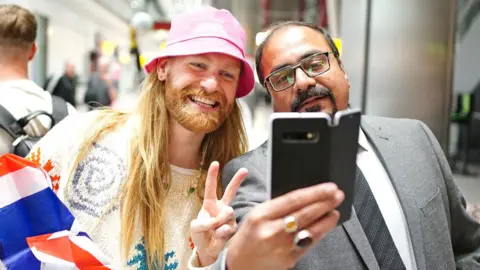Eurovision 2022: Russian vote hacking attempt foiled, police say
Pro-Russian hackers attempted to disrupt voting for the Eurovision Song Contest, Italian police have said.
Ukraine won the competition thanks to huge support in the public vote. Russia was banned following its invasion.
Police in Italy, where this year's contest was staged, said the Killnet hacker group targeted the first semi-final - in which Ukraine performed - as well as Saturday's grand final.
But they said their cybersecurity division blocked the attacks.
"Various computer attacks of a DDOS [distributed denial-of-service] nature aimed at network infrastructures during voting operations and singing performances were mitigated," a police statement said.
Ukraine's Kalush Orchestra won the contest with their song Stefania, which was the runaway winner in the public vote.
It topped the overall points tally after votes from the viewers were combined with the results from the national juries.
Meanwhile, Eurovision organisers have said there were also "irregular voting patterns" among the juries from six countries.
That meant the jury scores from those countries in the second semi-final and grand final were replaced with "a substitute aggregated result" - a score calculated by organisers, based on the results of other countries with similar voting records.
"In the analysis of jury voting by the European Broadcasting Union's (EBU) pan-European voting partner after the Second Dress Rehearsal of the Second Semi-Final of the 2022 Eurovision Song Contest, certain irregular voting patterns were identified in the results of six countries," a statement said.
'Voting manipulation attempts'
"The EBU takes any suspected attempts to manipulate the voting at the Eurovision Song Contest extremely seriously and has the right to remove such votes in accordance with the Official Voting Instructions, irrespective of whether or not such votes are likely to influence the results and/or outcome of the voting."
During the final, the jury scores from Azerbaijan, Romania and Georgia were read by Eurovision's executive supervisor Martin Österdahl instead of the usual national representatives.
An EBU spokesman declined to give further details.
 PA Media
PA MediaThe UK's Sam Ryder topped the jury scoreboard but was overtaken by Ukraine when the public votes were added.
Second place was the UK's best result since 1998, and came just a year after the country finished bottom with zero points.
Speaking on Monday after returning to Britain, Ryder told BBC Radio 4's Today programme he had "been swept up in the joy that is Eurovision" and it had been the "most rewarding experience ever".
And he told BBC Radio 2's Zoe Ball: "I felt so much, just encouragement and support and love from home. And not just home, but in the Eurovision community in general, because there's so much love, sitting in that arena is like being in a church, it is just incredible.
"I can't explain it, and I can't even begin to do it justice, the feeling that you have when you're there.
"But going on that stage, it just felt like, just trust in everything. Trust in the years that you've been singing and enjoying singing and music and take it all in."
